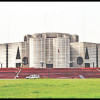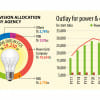What is the national budget and why should you care?

Every media outlet is already flooded with news about the annual budget for the 2024-25 fiscal year to be placed at the parliament tomorrow.
The budget takes up a huge chunk of the public's attention around this time every year. However, with the talk of thousands of crores of taka in one sector or another, tax rates or duty on certain goods being increased or decreased, and policy analysis that can get quite complicated—the budget is a crucial element of what the government does that the general public is often not completely in tune with. Even though the media tries to keep the masses informed, many struggle to understand why the budget is important to each and every individual on a personal level, and why they should care.
So, what is the national budget, actually? Is it an event? A document? Or is it just a really important spreadsheet?
In simple terms, it is the annual financial statement of the government. The budget projects how the government plans to make money and spend money in any given fiscal year (from July of one year to June of the year after). It outlines the government's fiscal policy, setting aside certain amounts of money for specific usages, while forecasting income from specific sectors.
In a given fiscal year, it may be the case that the government's projected income is lower than its planned expenditure. In this scenario, the government runs a deficit, and it makes up for it by borrowing from private banks, the central bank, or international partners. For example, the budget for 2023-24 projected a revenue of Tk 5,03,900 crore, and an expenditure of Tk 7,61,785 crore, meaning that the government ran a budget deficit of Tk 2,57,885 crore, more than 5 percent of the GDP.
The budget, once formulated by different government departments, is presented as a proposal by the finance minister to the members of the parliament. The parliament has the power to agree to it, reject it, or agree to a budget subject to a reduction in the amount of expenditure projected.
Tomorrow, June 6, the Bangladesh government's budget for the fiscal year of 2024-25 will be presented by Finance Minister Abul Hassan Mahmood Ali to the 12th National Parliament.
Now, we need to understand why the contents of this budget proposal are so crucial.
Dr Ashikur Rahman, Principal Economist at the Policy Research Institute, helps us understand this.
"The budget is important because it shapes what kinds of services and opportunities are available to a person. If you're a young person looking for a job, public and private investment shapes whether there are enough jobs in the economy. If you work within a fixed income group, you're concerned with whether inflation will spike or stay normal, and the budget, to an extent, determines this. If you're an elderly person, if you live in a marginalised community, if you come from an economically challenging background, the budget determines how much money we're spending on the social safety net, and therefore, how much money is available for you," he explains.
"The budget allocates investments and expenditure on different sectors, and therefore it affects livelihoods through different means. This is why people should take deep interest in how the budget is formulated and whether it is good or bad for the economy, even if someone is not an economist," he added.
While these indications may be some of the most important ways the budget affects our daily life, the easiest way to grab people's attention is by telling them which product, service, or commodity is likely to get more expensive or cheaper because of the budget.
The way the budget determines this is by imposing or repealing taxes and duties on the import, export, and sale of products. For example, a high import duty on laptops and computer components, coupled with the tanking value of the Bangladeshi taka against the US dollar, has made these essential products quite expensive. To mitigate this problem, the Ministry of Finance is planning to reduce the total tax incidence on laptops from 31 percent to 20 percent.
While the prices of certain products and services matter immensely, the budget delivers a lot more information as well, not least about the country's economic outlook for the near future.
With the economy struggling with high inflation, dollar shortage, and an increasing debt burden, this year's budget will provide insights on how the government intends on facing this challenge.
When it comes to this issue, Dr Ashikur Rahman explains that things can get a bit technical. However, he provides some indicators that a regular, informed individual can keep an eye on to get a better understanding.
"The budget crafts the fiscal policy of the government, and the fiscal policy must be aligned with the monetary policy. An informed individual must examine whether the contractionary monetary policy of the Bangladesh Bank is being complemented by a contractionary fiscal policy. A simple explanation of this would be to see if the government is taking up initiatives that are not necessary under the current scenario. We have to be conscious about whether the government is living beyond its means. If the government is borrowing disproportionately from private banks and the central bank, then it undermines the contractionary economic management that experts have been suggesting. It will undermine inflation management, debt management, and it won't help the foreign reserve scenario," he said.
People should be on the lookout for a strategic shift in this year's budget, according to Dr Ashikur Rahman, because that is what the current economic situation demands.
"Between 2010 and 2019, the government had an investment focus. It borrowed large sums from the international market as interest rates became very low after 2008. And we saw mega-infrastructures coming up like never before. However, post-Covid and post-Ukraine war, we have seen global interest rates going up. We now need the government to shift from investment-orientation to saving-orientation. This shift will tame inflation, reduce demand for imports, stabilise foreign exchange reserves, and keep debt at a manageable level," he added.
The budget holds a lot of information about how specific products and markets will behave in the coming year, affecting the lives of people connected to them. At the same time, this year's budget is going to be a crucial instrument in fighting the economic challenges facing Bangladesh, which is why it is doubly important for everyone to stay updated.

 For all latest news, follow The Daily Star's Google News channel.
For all latest news, follow The Daily Star's Google News channel. 










Comments